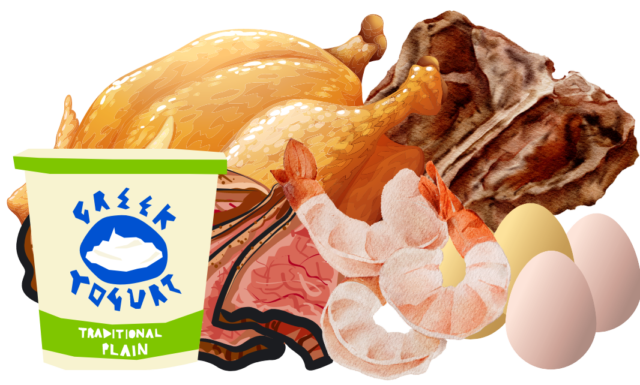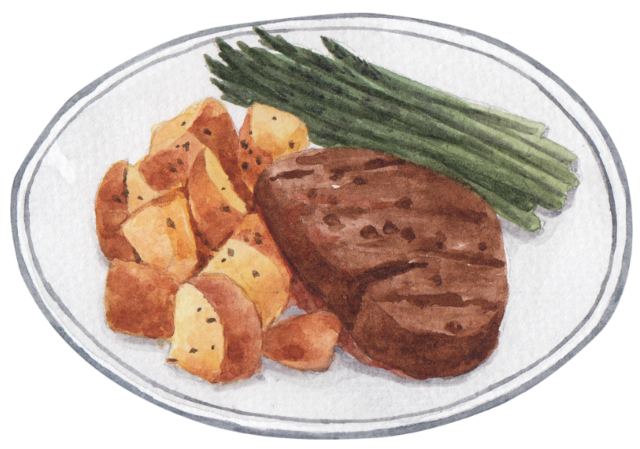You may think of big male bodybuilders when you think about protein, but eating enough protein is important for women too (as is strength training!). Eating sufficient protein may be the missing link for you in your health/nutrition journey. For many years, when I was eating paleo, I didn’t even consider protein. I just ate whatever I wanted as long as it was considered paleo. After I developed chronic health issues, and I began working on healing my metabolism, I noticed a huge difference when I began including protein in every meal and snack that I ate.
I personally noticed:
- I felt more satisfied after meals
- My blood sugar was balanced
- My muscles grew faster
- I got stronger
- My mood was stable
- I felt calmer and less stressed
Why Protein is Essential:
Protein is needed for the growth and maintenance of the body. There are 4 main roles of protein in the body.
- Enzymes: These are protein molecules that act as catalysts for all biochemical processes in the body
- Hemoglobin: These are specialized proteins, in the form of red blood cells, that carry oxygen throughout the body
- Antibodies: These are proteins that fight off infections
- Hormones: These are proteins that regulate our metabolism and almost every function in the body. The main protein hormones are insulin, which regulates blood sugar and thyroid hormone, which regulates metabolic rate.
Best food sources of protein:
- Beef
- Chicken
- Turkey
- Pork
- Lamb
- Bison
- Fish/shellfish
- Eggs
- Milk
- Cheese
- Yogurt
- Bone broth
- Organ meats

Protein is comprised of amino acids, which are known as the building blocks of protein. Animal proteins are the best sources because they are the most bioavailable and contain all the essential amino acids, which makes them complete proteins. Plant proteins, on the other hand, have to be combined in order to get all of the essential amino acids. For example, rice and beans. However, if plant proteins aren’t properly prepared (soaked, sprouted or fermented), it’s hard for the body to absorb the nutrients contained in them, making them less bioavailable.
What are amino acids?
Some amino acids (such as norepinephrine, serotonin, GABA, acetylcholine, aspartate, and glutamate) act as neurotransmitters by carrying messages from nerve to nerve in the nervous system.
| Amino Acid | What It Does | Foods It’s Found In |
| Isoleucine | Produces energy, Reduces twitching, Aids in muscle growth | Fish, Meat, Cheese, Wheat Germ, Nuts and Seeds |
| Leucine | Produces energy, Aids in muscle growth, Heals wounds in bones and skin | Chicken, Red Meat, Dairy, Wheat Germ, Oats |
| Lysine | Aids in absorption of calcium, Promotes bone growth, Aids in production of collagen | Fish, Meat, Dairy, Wheat Germ, Legumes, Fruits and Vegetables |
| Methionine | Promotes healthy skin and nails, Prevents excess fat buildup in the liver, Relieves/prevents fatigue, Lowers histamine | Dairy, Eggs, Fish, Meat, Corn, Rice, Nuts and Seeds |
| Phenylalanine | Boosts mood, Reduces pain, Increases endorphins | Meat and Milk |
| Threonine | Creates tooth enamel, elastin and collagen, Controls fat build up in the liver, Boosts immunity | Meat, Dairy, Eggs, Wheat Germ, Nuts, Seeds and Vegetables |
| Tryptophan | Boosts mood, Reduces insomnia, Protects brain health, Reduces pain | Meat, Eggs, Dairy, Nuts and Seeds |
| Valine | Produces energy, Aids in muscle growth, Promotes liver and gallbladder health | Meat, Fish, Dairy, Nuts and Seeds, Vegetables |
| Arginine | Stimulates pituitary gland to create and secrete human growth hormone, Assists in wound healing, Promotes fertility, Promotes healthy hair, Aids in muscle growth | Meat, Milk, Cheese, Eggs and Nuts |
| Cysteine and Cystine/Glutathione | Aids in detoxification, Repairs DNA, Neutralizes free radicals, Aids in wound healing, Boosts immunity, Aids in cancer prevention | Chicken, Yogurt, Egg yolks, Oats, Wheat Germ, Red peppers, Garlic, Onions, Broccoli and Brussels sprouts |
| Glycine | Promotes relaxation, Aids in wound healing, Protects brain health, Aids in detoxification, Produces energy, Boosts immunity | Meat, Fish, Nuts and Seeds |
| Histidine | Produces histamine, Lowers blood pressure, Improves absorption of minerals | Pork, Chicken, Cheese and Wheat Germ |
| Proline | Assists in bone, skin and cartilage formation, Aids in wound healing | Dairy, Eggs, Meat, Wheat Germ |
| Alanine | Component of muscle tissue, Regulates blood sugar, Prevents seizures | Beef, Pork, Turkey, Cheese, Yogurt, Wheat Germ, Oats and Avocado |
| Aspartic Acid | Improves mental health, Protects brain health, Produces energy | Meat, Dairy, Eggs |
| Glutamic Acid/GABA/Glutamine | Reduces anxiety, Lowers blood pressure, Increases libido, Supports muscle metabolism, Produces energy, Protects brain health, Decreases alcohol cravings, Decreases sugar cravings, Aids in healing ulcers | Meat, Dairy, Eggs, Vegetables |
| Homocysteine | Aids in cell and tissue growth, bone growth and insulin production | Meat, Dairy, Fish, Eggs |
| Serine | Aids in detoxification, Hormone production, Gene regulation | Meat, Dairy, Wheat, Peanuts |
| Tyrosine | Precursor to adrenaline (epinephrine), norepinephrine, dopamine and thyroid hormone, Stimulates growth hormone, Suppresses appetite, Decreases anxiety, Boosts mood, Antioxidant, Increases libido | Chicken, Turkey, Fish, Dairy, Nuts and Seeds, Bananas |
| Carnitine | Protects against cardiovascular disease, Assists with weight loss, Improves exercise capability, Enhances muscle building, Improves endurance, Prevents excess fat buildup in the liver | Red meat, Fish, Chicken, Dairy |
| Taurine | Aids in movement of minerals in and out of cells, Assists in gallbladder function, Boosts immunity, Improves vision, Promotes fertility | Meat, Fish, Shellfish |
As you can see from this chart, protein does a lot more than just promote muscle growth! It helps to balance blood sugar, along with carbohydrates and fat, which keeps our hormones balanced and metabolism running smoothly. However, just like carbs and fat, too much of a good thing is not good either. More does not equal better.
How much protein should you be eating?
For calculations, use your ideal weight
- Prevent Deficiency: 0.8 grams per 1 kg of body weight
- General Health: 1 gram per 1kg of body weight
- Muscle Building: 1.6 grams per 1kg of body weight
- Pregnancy/Breastfeeding: increase by 25 grams
For example, a woman whose ideal body weight is 120 lbs, which is 54 kg, would need 54 grams of protein per day for general health and 86 grams per day for muscle building.
If you include protein in all your meals and snacks, then you’ll easily consume enough protein.

Eat a Variety
It’s also important to eat a variety of proteins. Eating only muscle meats (chicken breast, steak, turkey, etc) can cause inflammation. You should rotate your proteins to include muscle meat, organ meat, dairy, fish/shellfish, eggs and collagen. This ensures you get all your micronutrients as well and avoid inflammation from too much muscle meat.
Source:
See Also:
Let’s Talk About Macronutrients
